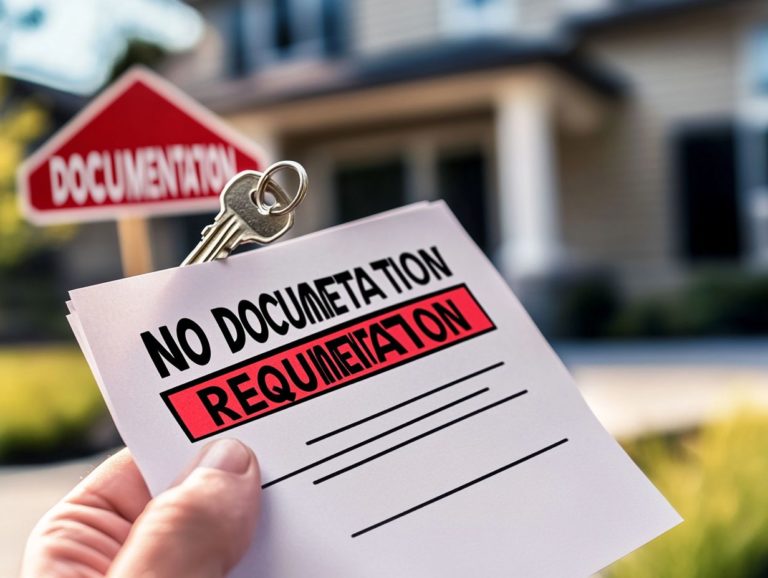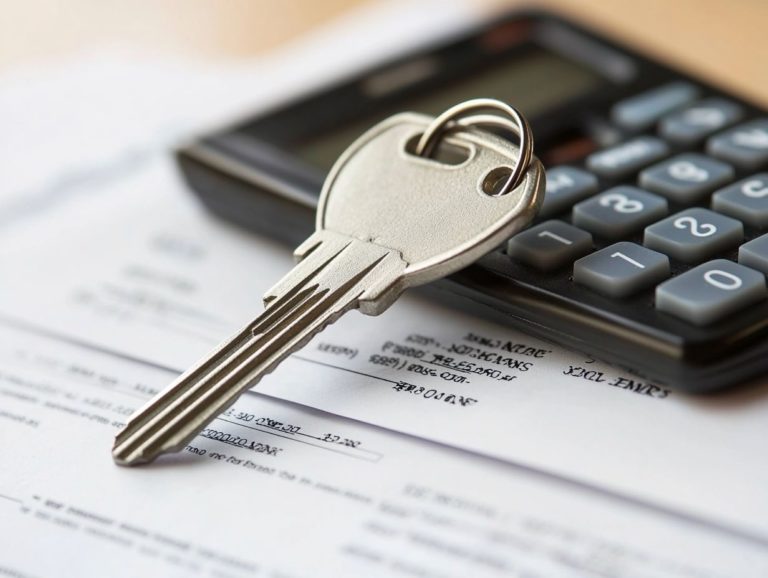How to Navigate Mortgage Underwriting
Navigating the world of mortgage underwriting may seem daunting, especially for first-time homebuyers or anyone unfamiliar with the process.
Understanding what mortgage underwriting involves, the role of underwriters, and the factors that influence their decisions is crucial for a seamless homebuying experience.
This article breaks down the underwriting process into manageable steps, provides tips for effective communication with underwriters, and addresses common challenges you might encounter.
By the end, you ll feel empowered and ready to tackle your mortgage journey with confidence.
Contents
- Key Takeaways:
- Understanding Mortgage Underwriting
- The Role of Underwriters
- The Underwriting Process
- Factors that Affect Underwriting
- Tips for Navigating Underwriting Successfully
- Common Underwriting Challenges and Solutions
- Preguntas Frecuentes
- Qu es la aprobaci n de hipotecas y por qu es importante?
- Cu les son los factores clave que los tasadores de hipotecas consideran?
- C mo puedo prepararme para el proceso de aprobaci n de hipotecas?
- Qu factores pueden causar retrasos en el proceso de aprobaci n de hipotecas?
- Puedo apelar una decisi n de aprobaci n de hipoteca?
- Cu nto tiempo suele tomar el proceso de aprobaci n de hipotecas?
Key Takeaways:

- Understand the role of underwriters in the mortgage process, including their responsibilities and qualifications.
- Prepare for underwriting by improving your credit score and reducing your debt compared to your income.
- Effective communication with underwriters and addressing potential issues can help you navigate underwriting successfully.
Understanding Mortgage Underwriting
Understanding mortgage underwriting is essential for you as a homebuyer navigating the intricate landscape of real estate financing. This process involves a careful review of key factors such as your credit history, income verification, and overall financial situation.
It doesn t just determine your loan eligibility; it also secures competitive mortgage rates. This allows you to make informed financial decisions that align with your personal goals.
As you delve deeper into mortgage underwriting, you’ll realize that thoughtfully considering each element can significantly impact your loan approval and shape your journey toward homeownership.
What is Mortgage Underwriting?
Mortgage underwriting is the process where you submit your loan application and the lender evaluates it to determine your creditworthiness and the associated risk.
This process is essential for protecting the lender’s investment and ensuring that you are matched with loans that fit your budget and can be managed effectively.
Underwriters play a pivotal role here, examining various financial documents, including income statements, credit reports, tax returns, and employment verification forms.
By analyzing these documents, they assess your financial stability and repayment capability. This allows them to make informed decisions regarding the loan amount and interest rates.
Their expertise ensures that the lending process remains fair and responsible, ultimately fostering a healthier housing market for everyone involved.
The Role of Underwriters
The role of underwriters is crucial in the mortgage process. They carry out comprehensive risk assessments to ensure loan approvals adhere to guidelines established by entities like Fannie Mae and Freddie Mac.
You ll discover that underwriters examine financial data meticulously to evaluate whether borrowers can meet their payment obligations based on their financial circumstances and credit profiles. This careful analysis helps lenders mitigate risk and promotes homeownership for qualified borrowers.
Responsibilities and Qualifications
Underwriters have the important responsibility of setting standards for loan approval. They ensure that all financial documents, including income and employment verification, are carefully evaluated.
You ll see these professionals rigorously examining a borrower s credit score, which is a vital indicator of their ability to manage debt responsibly.
They dive deep into the applicant’s financial landscape, scrutinizing assets and liabilities for a comprehensive understanding of economic stability. In this process, underwriters assess various qualifications essential for loan approval, such as the ratio of your debt to your income and overall creditworthiness.
By synthesizing this information, they not only protect lending institutions from potential risks but also ensure a fair evaluation for applicants seeking financial support.
The Underwriting Process

The underwriting process is a careful process that assesses your financial health through your loan application, employing a blend of automated underwriting and traditional methods.
This comprehensive journey includes essential steps like income verification, property appraisal, and evaluations of the amount of money you owe compared to how much you earn. These steps play a pivotal role in the lender’s decision-making regarding loan approval.
By knowing these steps, you can confidently navigate the intricate landscape of mortgage underwriting and position yourself for success.
Steps and Timeline
The steps and timeline in the underwriting process can significantly influence your overall mortgage experience. This can often stretch from several days to weeks, starting from your loan application all the way to final approval. Understanding these stages is crucial, as each phase from the initial submission to document verification and ultimately reaching the decision-making point can impact potential closing costs and adjustments.
- Typically, once you submit your loan application, it enters an initial review, where basic information is evaluated to determine your eligibility. This phase usually takes about one to three days.
- After that, the underwriter will request additional documentation for a thorough risk assessment. This could add another week, depending on how quickly you provide those documents.
- Once all factors are analyzed, you can expect a formal decision within a few days.
Knowing this process gives you the power to navigate your mortgage journey effectively and anticipate any financial implications that may arise during closing.
Factors that Affect Underwriting
Several factors can greatly influence the underwriting process, including your credit score, the amount of money you owe compared to how much you earn, and your overall financial situation.
Lenders meticulously evaluate these elements during mortgage preapproval to assess the risk tied to each applicant.
By understanding how these factors impact underwriting, you can better prepare your financial profile as a prospective homebuyer.
Credit Score and Debt-to-Income Ratio
Your credit score and the amount of money you owe compared to how much you earn are two essential metrics that underwriters scrutinize to evaluate your financial situation. These indicators offer invaluable insights into your creditworthiness and financial stability.
A credit score ranges from 300 to 850 and reflects your past borrowing behavior, payment history, and how you manage credit.
The debt-to-income ratio compares your monthly debts to your gross monthly income, providing a clear picture of how much of your earnings are tied up in existing liabilities. Together, these figures play a critical role in the risk assessment process.
A higher credit score paired with a lower debt-to-income ratio signifies lower risk, greatly increasing your chances of loan approval and potentially securing lower interest rates. Understanding these factors is crucial for anyone aiming to obtain financing.
Successfully navigating the underwriting process demands careful preparation and strategic communication with underwriters. Gather your documents now to speed up your approval!
Preparing for the Process

Preparing for the underwriting process requires you to gather a comprehensive set of financial documents, including income and employment verification, to bolster your loan application. This critical step streamlines evaluation and allows you to present a thorough financial portrait to the underwriters.
Key documents you should typically prepare include:
- Pay stubs
- W-2 forms
- Bank statements
- Tax returns
It’s wise to maintain records of any additional income sources and outstanding debts, as these elements significantly impact the assessment of your overall financial health. By meticulously organizing this documentation, you elevate your chances of enjoying a smooth underwriting experience while accelerating the loan approval timeline.
With the right preparation, you’re one step closer to your new home!
Communicating with Underwriters
Effective communication with underwriters is crucial for a seamless mortgage process. It clarifies your financial situation and speeds up the review of your loan application.
Loan officers serve as the vital link between you and the underwriting team. They guide you on presenting your financial circumstances clearly, ensuring that all relevant information is disclosed effectively.
Asking the right questions is important; it involves examining the nuances of your income streams, assets, and debts. Crafting compelling narratives that illustrate your financial journey empowers underwriters to make informed decisions.
Create a collaborative atmosphere where communication flows effortlessly to lead to a more efficient loan approval process.
Common Underwriting Challenges and Solutions
During the mortgage application process, you may encounter common underwriting challenges, often due to discrepancies in financial documents or insufficient credit scores.
By understanding these challenges, you can pave the way for effective solutions that facilitate a smoother approval process.
Addressing Issues and Roadblocks
Addressing issues and roadblocks in the underwriting process requires proactive measures. Promptly resolve discrepancies in financial documents and conduct a thorough review of your credit history.
Maintain clear and open communication with your lenders. Regular updates on your document submissions can alleviate concerns, and understanding specific requirements upfront can prevent misunderstandings.
If difficulties arise, share relevant context about any financial changes or credit events. This fosters collaboration, allowing underwriters to better assess your situation.
Ultimately, transparency and swift responses are essential. These strategies minimize delays and streamline the process, resulting in a smoother borrowing experience for you.
Preguntas Frecuentes
Qu es la aprobaci n de hipotecas y por qu es importante?

La aprobaci n de hipotecas eval a la solvencia crediticia de un prestatario y determina el riesgo para el prestamista al proporcionar un pr stamo hipotecario. Ayuda a los prestamistas a decidir sobre pr stamos y tasas de inter s.
Cu les son los factores clave que los tasadores de hipotecas consideran?
Los tasadores de hipotecas consideran la puntuaci n de cr dito del prestatario, la relaci n deuda-ingresos, el historial laboral y el valor de tasaci n de la propiedad. Tambi n tienen en cuenta el tipo de hipoteca y el monto del pago inicial.
C mo puedo prepararme para el proceso de aprobaci n de hipotecas?
Para prepararte, re ne todos los documentos necesarios, como recibos de pago, declaraciones de impuestos, extractos bancarios y otros registros financieros. Revisa tu informe de cr dito y aborda errores o deudas pendientes.
Qu factores pueden causar retrasos en el proceso de aprobaci n de hipotecas?
Los retrasos pueden ser causados por documentaci n incompleta, valores de tasaci n bajos, problemas con la puntuaci n de cr dito o cambios en la situaci n financiera del prestatario. Trabaja en estrecha colaboraci n con tu prestamista y proporciona informaci n solicitada de inmediato para evitar retrasos.
Puedo apelar una decisi n de aprobaci n de hipoteca?
S , puedes apelar una decisi n de aprobaci n si crees que hubo un error. Es posible que necesites proporcionar documentaci n adicional para respaldar tu apelaci n. Consulta con un profesional de hipotecas o tu prestamista para obtener orientaci n sobre el proceso.
Cu nto tiempo suele tomar el proceso de aprobaci n de hipotecas?
El proceso de aprobaci n de hipotecas puede ser r pido! Puede tomar desde unos pocos d as hasta varias semanas, dependiendo de la complejidad de tu pr stamo y de tu situaci n financiera.
Mantente en contacto con tu prestamista y prep rate para cualquier retraso! Un tasador, o evaluador de propiedades, revisar el valor de la casa que deseas comprar, as que aseg rate de estar listo.





